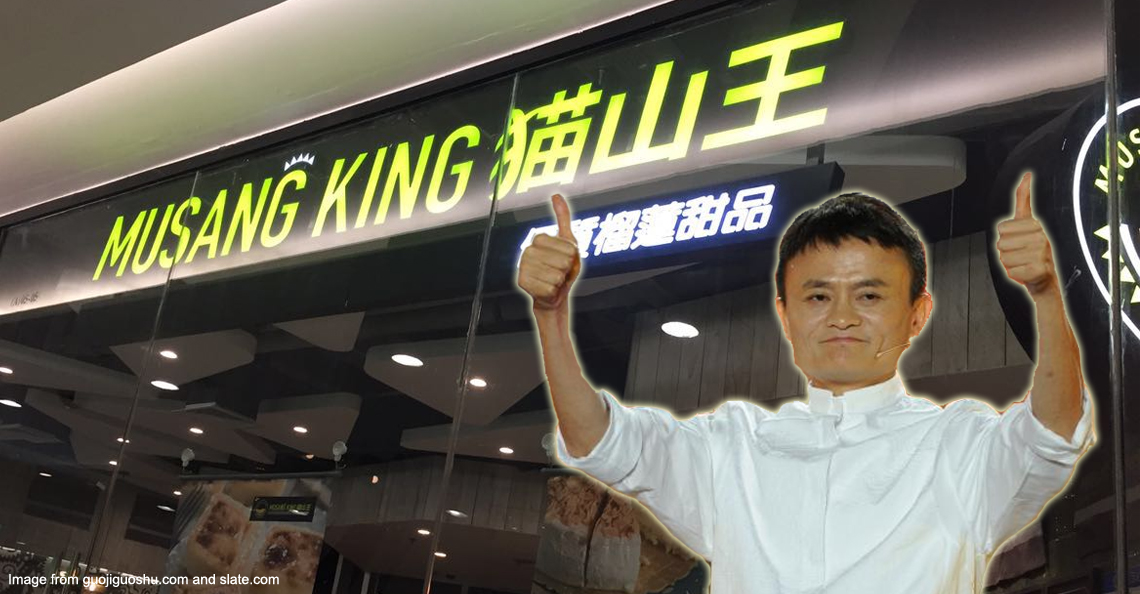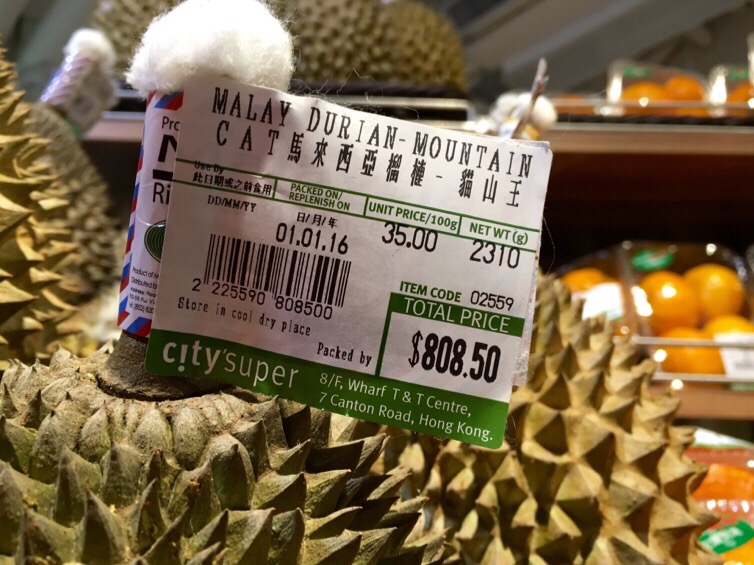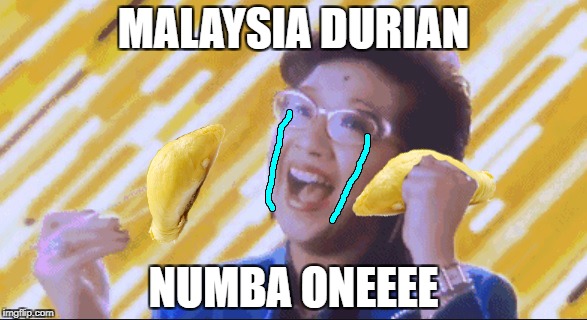Malaysians living in China tell us how different the durian scene is over there

- 988Shares
- Facebook762
- Twitter14
- LinkedIn41
- Email43
- WhatsApp128
There has been a foul stench surrounding durians on the news lately. You might have even seen this viral news about cheap Malaysian durians being sold in Bentong and Raub because they were actually rejected by China because of high pesticide content, accompanied by a picture of mountains of durian in some kind of warehouse area.
While the news has probably managed to fool many WhatsApp family groups, the hoax was obviously a prickly subject to durian insiders, and was quickly debunked by a food blog, durian experts, and even the Ministry of Agriculture and Agro-based Industry (MOA) itself after the news went viral.
“For the time being, fresh whole durian from Malaysia has not been granted access into China markets.” – Datuk Mohd Sallehhuddin Hassan, Deputy Secretary-General of the Ministry of Agriculture and Agro-based Industry, quoted from Berita Harian
This fake durian news came not long after the heat surrounding the increasing demand from China for “Malaysian durian”, leaving a bitter taste in the mouth of durian lovers, and even Singapore was shaking in their 100 dollar boots over the possibility of a durian shortage. So, we decided to take a look behind the Great Wall (of China), and see how much truth is there to the durian dilemma.
We asked Malaysians living across China to describe the durian scene there
We know that Chinese people would eat just about anything that moves, but how “big” (as the kids say) is durian in China? We managed to ask 3 Malaysian expats: Dannie who is based in Beijing, KC who is living Tianjin, Muhammad Zaki who is in Xi’an, and Pat from Nanjing.
“From what I see in Beijing, I don’t see them very often apart from processed durian products (cakes and etc) in cafes like Musang King.” – Dannie told CILISOS
“China is very big and so is the wealth gap, geographically. It’s more common in major cities where people can afford it, and many like it.” – KC told CILISOS
“Its quite common actually, usually I find it in the supermarket like Vanguard, Walmart & Metro. More commonly its the whole fruit, although sometime you found it frozen.” – Muhammad Zaki told CILISOS
So unlike in Malaysia, you expect to see pop up stalls in China selling durians by the roadside, not in big cities anyway. But in Nanjing, Pat observes a changing trend.
“Durian more and more common here now because people are richer now. Available on some road sides on trucks but more commonly in supermarkets. Whole fruits or packed.” – Pat told CILISOS
But durians in China are quite a luxurious product in China, and hence is more expensively relative to Malaysia. Dannie tells us that a pack of frozen ones can be about 150-300 yuan (RM94 – 187) in supermarkets (and its not even musang king), while we can buy fresh packs of durian here for RM30 – 40. The MOA even said that a kilo of Musang King can fetch RM200 per kg in China!
“Prices are crazy not worth for us Malaysians or Singaporeans. But locals will pay.” – Pat
As for variety, KC tells us that they only have 1 or 2 choices, but it makes no difference to them as they don’t eat it very often. Despite that, they don’t have to wait for durian seasons like in Malaysia, since the frozen products can last about a year or so. But… does frozen durian taste as good as fresh ones?
“I dunno. Never tried the frozen ones though, I only believe in fresh ones.” – Dannie
“Frozen musang king is as good as in Malaysia due to advance technology. I ate.” – KC
“I’ve tried both the fruit & frozen. But taste quite similar. When I say its frozen its not that its completely frozen. It was taken from the imported fruit & store in a chiller. I never tasted a fully frozen imported durian. By the way both of them are not great.” – Muhammad Zuki
China Chinese also literally cooked up a unique way of eating durian. Introducing the durian hot pot, because anything worth eating in China is worth dumping into a hot pot. You can check out the video below:
There’s also a home recipe for a durian chicken soup if you’re interested. We got no idea as to what it tastes like none of our respondents have ever ate it before, suggesting that its not a common cuisine in China.
China durians mainly come from Thailand, and they travel a long way to get there
While China interest in Musang king was sudden, it was not due to the lack of trying on our gomen’s part. Malaysia’s attempt to court China to increase our durian exports has not gone unnoticed. Back in late October 2017, international press caught a whiff of the Malaysian Durian festival which was held from November 3rd to 5th 2017 in Nanning, China. For the occasion, Malaysia got a one-time approval from China to import 4,000kg of fresh durian. The festival was very well received, the Musang King in particular was so impressive that a China VIP declared Malaysia’s durian “number 1 in the world” (presumably with seulas durian in each hand and tears in her eyes).
As mentioned previously, no fresh whole durian from Malaysia is allowed into China, and only frozen pulps and processed durian products are allowed. China gets their durian fix mainly from Thailand, who also happens to be the biggest exporters of durian in the world. Besides that, Thailand’s durian species is also more convenient because it can rippen during transport, while on the other hand, we know Malaysia’s durian (including the Musang kin) has a shorter shelf life before the taste and smell start “running“.
Additionally, the route of exporting durians to China isn’t exactly straight forward. Shipping the fruits require cold storage (not the supermarket) facilities, which is why its mostly brought in by sea and through Hong Kong because of better cooling facilities, before finally reaching mainland China. But Mark Mozur, a China agricultural market researcher tells us that in recent years, Malaysian exporters have begun to ship directly to the mainland.
“In recent years exporters from Malaysia have begun to ship to the mainland. The trouble is the mainland receives a high volume of illegal supplies from Vietnam and Thailand that can sometimes out-compete Malaysian durian.” – Mark Mozur from ChinaAg told CILISOS
Anyway, Malaysia is currently expecting to ship fresh fruits in 1 to 2 years time. In the meantime, they will have to look for ways to fulfill China’s import regulations.
“They called it the cold treatment of below 18 degrees. Once we fulfill the requirements, then we have to find the right ports or destination for the durian,” Minister Ahmad Shabery Cheek, quoted from Channel News Asia
The Chinese were probably not the ones made durian prices jump
All the talk about China buying more durians has left durian lovers in Malaysia and Singapore wondering about China’s appetite would do prices and availability in the future. Director of Malaysia’s Desaru Fruit Farm Alice Tong told Channel News Asia she would see “hundreds” of Chinese tourists per week in 2016. Now, she sees thousands of them.
But MOA Minister Datuk Seri Ahmad Shabery Cheek attributes this year’s high pricing to the decrease in production, more than the increase in demand in China.
“Exports of durian to China is still low in 2015 at around RM23 million, compared to RM18 million last year.” – MOA Minister Datuk Seri Ahmad Shabery Cheek, quoted from The Sun Daily
To be fair, prices of durian are determined by demand and season, as plantation owner Wui Heong once told us. Musang king would be the best example, because while it fetched prices of RM90-100 in KL during June 2017, the “Hong Xia” durian only cost RM30 per kg simply because it was less popular. The pricing this year (2017) was also greatly affected by the weather, as the rainy season made it hard for durian flowers to grow into fruits, the harvest 70–90% less this year.
According to Datuk Charon Wardini Mokhzani, the managing director of the Khazanah Research Institute, most of the durian harvested in Malaysia is consumed by Malaysians. Out of the 400,000 tonnes of durian harvested last year, only 20,000 tonnes was exported. Besides, we got about 204 types of durians registered under the Agriculture Department, there’s a whole universe of durians out there waiting to be savoured, and the entire time, China has only expressed interest in the Musang king.
Durian can be a great source of income, but save some for us too!
Being the largest population in the world, it’s not just the demand for durian that’s been growing in China. China’s demand for all sorts of tropical fruits has been on the rise, according to multiple sources that quoted a UN data (that we couldn’t find). This also means that there’s a growing market nearby that Malaysia and its farmers can benefit from, because even when we’re consuming most of our durians, we’re still the second largest durian exporter in the world!
“We have been given a natural monopoly on tropical fruits. We must use this and make tropical fruit farming a high-income occupation that raises rural incomes and reduces the income and wealth divide between the countryside and the towns.” – Datuk Charon Wardini Mokhzani, wrote in The Star
As of now, there doesn’t seem to be much gomen interest in intervening with Musang king prices to make it more affordable. As the MOA minister puts it:
“I will be very worried if the prices of basic necessities, like rice, go up. But durians and pineapples are not our basic food,” – Minister Datuk Seri Ahmad Shabery Cheek, quoted from New Straits Times
In the meantime, we’ll just have to wait and see how the new trade with China will go, hope to god that we won’t have to pay RM100 per kg for Musang king next year, and not fall for fake ones.
- 988Shares
- Facebook762
- Twitter14
- LinkedIn41
- Email43
- WhatsApp128





